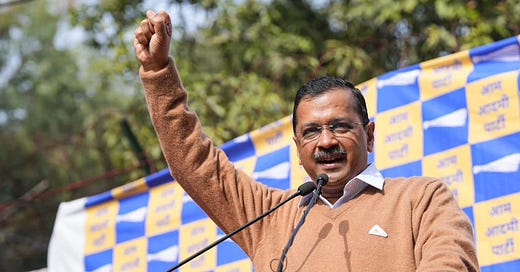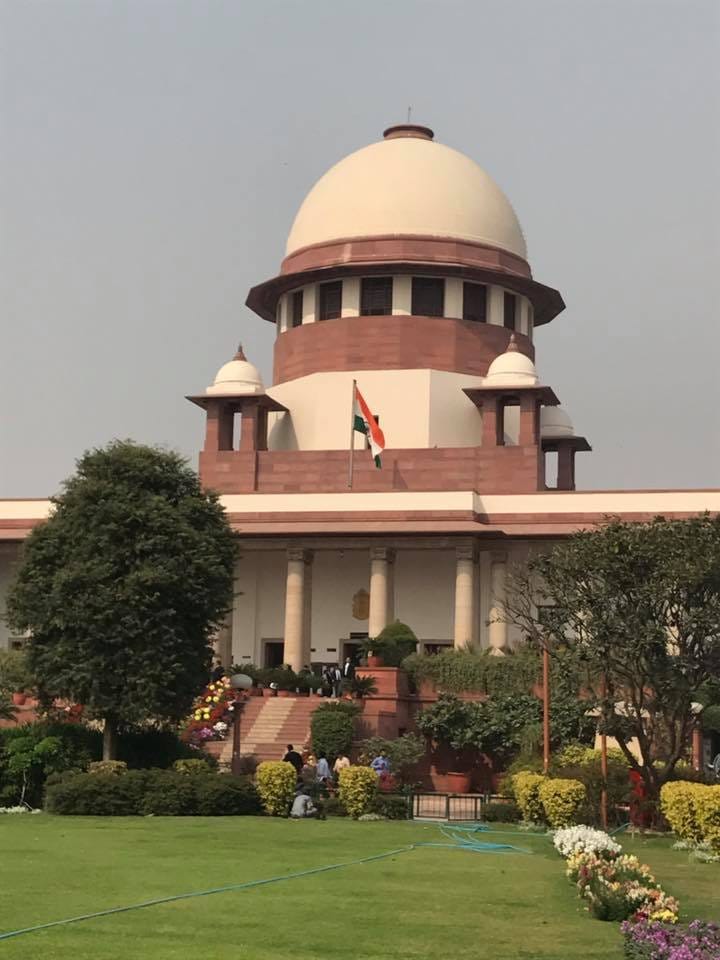Kejriwal to Walk Free from Tihar as Supreme Court Grants Bail in CBI Liquor Policy Case
Legal Analysis, Diverging Views of the Justices, Justice Ujjal Bhuyan’s Scathing Criticism of the CBI, and the Broader Political Impact.
The Supreme Court of India delivered its judgment today, granting bail to the embattled Delhi Chief Minister Arvind Kejriwal in the CBI case related to the alleged Delhi Liquor Excise Policy scam. The judgment followed a comprehensive hearing on 5th September, after which the apex court had reserved its decision. The Supreme Court’s ruling, embodied in 60 pages, to release Kejriwal on bail came with strict conditions, reflecting both the gravity of the allegations against him and the need to uphold the integrity of the ongoing investigation.
Terms and Conditions of Bail
The specific terms and conditions imposed on Kejriwal’s bail—virtually identical to those set in the ED case—are as follows:
Kejriwal is prohibited from making any public comments on the merits of the case.
He must furnish a surety of ₹10 lakhs.
He is barred from visiting the Office of the Chief Minister and the Delhi Secretariat.
Kejriwal cannot sign any official files unless it is necessary for obtaining clearance from the Lieutenant Governor of Delhi.
He is prohibited from interacting with witnesses and from accessing official files connected to the case.
All the other conditions imposed in the Enforcement Directorate (ED) matter will also apply in this case.
These conditions sharply restrict Kejriwal’s public and official engagements, indicating the Supreme Court’s concern about preserving the integrity of the investigation while allowing him limited personal freedom and liberty under bail.
Arrest, Previous Bail(s) and the Bail Order Now
Kejriwal was first arrested by the Enforcement Directorate (ED) on 21st March 2024 in connection with the liquor excise policy scandal. He was granted limited-period interim bail by the Supreme Court, which allowed him to campaign in the Lok Sabha elections. Following the elections, he promptly returned to Tihar Jail as required. However, a Bench comprising Justice Sanjiv Khanna and Justice Dipankar Datta later revisited the interim bail order, recognising the sacrosanct nature of the right to life and liberty. Given that the legal questions raised in the case warranted in-depth scrutiny by a larger Bench, this 2-Judge Bench of the Supreme Court granted him interim bail again on 12th July 2024, specifically in the ED case.
Despite this, Kejriwal remained in custody due to a separate arrest made by the CBI on 26th June 2024, while he was still in judicial custody. His current bail pertains to the CBI case, which is distinct from the earlier interim bail granted in the ED case, and now paves the way for his actual release from Tihar Jail.
The Supreme Court's decision to grant bail today in the CBI case was widely expected, given that the threshold for bail in the Prevention of Money Laundering Act (PMLA) cases is generally higher than in CBI matters. The stringent Section 45 of the PMLA, which governs money laundering cases, does not apply in the CBI case, where the focus is on the predicate offence under the Prevention of Corruption Act, 1988.
Justice Ujjal Bhuyan’s Scathing Remarks
While the two Supreme Court Justices were unanimous in granting bail per se, Justice Ujjal Bhuyan, in a separate judgment, sharply criticised the CBI’s conduct concerning the legality of Kejriwal’s arrest. He specifically focused on the timing and necessity of the arrest. Justice Bhuyan pointed out that although the CBI had registered the case in August 2022, it did not arrest Kejriwal for over 22 months, during which he had already joined the investigation when summoned. It was only when Kejriwal’s bail application in the ED case was nearing completion in the Supreme Court that the CBI sought and obtained his custody while he was still in judicial detention. Justice Bhuyan suggested that this timing raised questions about the CBI’s motives, implying that the agency’s actions appeared designed to prolong Kejriwal’s detention on extraneous grounds.
“When the CBI did not feel the necessity to arrest the appellant for 22 long months, I fail to understand the great hurry and urgency on the part of the CBI to arrest the appellant when he was on the cusp of release in the ED case,” Bhuyan stated. His remarks cast doubt on the legitimacy of the CBI’s urgency in arresting Kejriwal, suggesting it may have been an attempt to undermine the judicial process.
Justice Bhuyan further emphasised that the pre-trial process should not become punitive in itself, reaffirming the principle that an accused is presumed innocent until proven guilty. “Bail is the rule and jail is the exception,” he remarked, criticising the grounds for Kejriwal’s continued detention, particularly in light of his bail in the ED case. Bhuyan concluded that Kejriwal’s ongoing incarceration in the CBI case was untenable and could not be justified based on the available evidence.
Criticism of the CBI’s Role
Justice Bhuyan also raised broader concerns about the role of the CBI, referencing the Supreme Court's past criticism of the agency as a “caged parrot.” He warned that the CBI must not only act impartially but must also be perceived as doing so, especially in politically sensitive cases. “In a functional democracy governed by the rule of law, perception matters. Like Caesar’s wife, an investigating agency must be above board,” Bhuyan said, implying that the CBI’s actions in this case had failed to inspire public confidence.
Additionally, Justice Bhuyan expressed "serious reservations" regarding the two bail conditions barring Kejriwal from entering the Chief Minister’s Office and signing official files, as imposed in the ED bail order. While he refrained from elaborating further due to judicial propriety, his remarks indicated discomfort with these restrictions. Given this difference of opinion between the two Judges, the more onerous conditions regarding bail, as enumerated by us hereinbefore, shall apply.
Justice Surya Kant’s Approach
Justice Surya Kant, while concurring with the decision to grant bail, took a more restrained approach in assessing the CBI’s conduct. He did not share Justice Bhuyan’s level of scepticism towards the agency’s actions, focusing instead on ensuring that the investigation could continue without interference. Justice Kant did not find any illegality in Kejriwal’s arrest, emphasising the need for strict bail conditions to prevent Kejriwal from influencing the legal process or tampering with evidence.
Justice Kant’s reasoning was more conventional, prioritising the balance between protecting the investigation and upholding the rights of the accused. His judgment concentrated on ensuring that the bail conditions were stringent enough to safeguard the integrity of the ongoing investigation, without questioning the CBI’s motives in the way Justice Bhuyan had done.
Summing Up the Bail Order
The Supreme Court’s judgment, delivered today at 10:30 AM, presents a nuanced view of the legal proceedings involving Arvind Kejriwal. While both Justices Ujjal Bhuyan and Surya Kant agreed on granting bail, their reasoning— especially in the matter of the legality of the arrest by the CBI— diverged sharply. Justice Bhuyan’s strong criticism of the CBI’s conduct called into question the timing and necessity of Kejriwal’s arrest, while Justice Kant focused more on the legal framework of the case and the conditions necessary to ensure the investigation’s progress.
The stringent bail conditions imposed on Kejriwal reflect the the Apex Court’s recognition of the seriousness of the case, while Justice Bhuyan’s scathing remarks raise larger concerns about the independence and integrity of investigative agencies, especially the CBI. This judgment not only impacts Kejriwal’s immediate freedom and liberty but also highlights significant questions about the fairness and transparency of legal processes in politically sensitive cases.
Political and Administrative Implications
The bail granted to Arvind Kejriwal will undoubtedly have significant political and administrative ramifications. It will energise the rank and file of the Aam Aadmi Party (AAP), restoring a sense of confidence within the leadership. Decision-making, both political and administrative, is expected to become smoother, particularly in the National Capital Territory (NCT) of Delhi and Punjab, where the party holds power. Kejriwal's release will also allow him to take charge of the campaign for the Haryana Assembly elections, where AAP has been eyeing an alliance with a resurgent Congress led by Bhupinder Singh Hooda, though no formal agreement has been reached.
Despite the stringent bail conditions, these are not likely to hinder Kejriwal’s governance significantly. Since his arrest on 21st March 2024, the Delhi Government has functioned relatively smoothly without him holding a ministerial portfolio. The challenge may arise in chairing cabinet meetings, which Kejriwal might address by holding them at a neutral venue or delegating the responsibility to one of his ministers. Whether Manish Sisodia returns as Deputy Chief Minister also remains uncertain, given his own legal battles as well as the internal politics of the AAP.
The BJP has already begun building a counter-narrative around Kejriwal’s legal troubles, framing it as "first the CM was in jail, now the CM is on bail." However, Kejriwal has weathered a strong personal and political storm, and his successful navigation through this period is likely to strengthen his position both in Delhi and beyond. The ongoing trials by the CBI and ED, which involve hundreds of witnesses and thousands of documents, may drag on for years, potentially even a decade. Nonetheless, Kejriwal’s political influence is expected to remain formidable, as he continues to steer AAP through these legal and political challenges.
Executive Gist of the Supreme Court Order Today
Based on the Supreme Court order, here's our exclusive summary focusing on the operative part:
1. The Supreme Court granted bail to Arvind Kejriwal in the CBI case related to the Delhi liquor excise policy scandal.
2. The Court dismissed the appeal challenging the legality of Kejriwal's arrest.
3. The Court allowed the appeal against the High Court's judgment dated 05.08.2024 and set it aside.
4. Kejriwal is to be released on bail subject to the following key conditions:
a. He must furnish bail bonds of Rs. 10,00,000 with two sureties of the same amount.
b. He is prohibited from making public comments on the merits of the CBI case.
c. The terms and conditions imposed by the Supreme Court in the ED case (Criminal Appeal No. 2493/2024) will apply to this case as well.
d. He must be present at all trial court hearings unless exempted.
e. He must fully cooperate with the trial court for expeditious conclusion of proceedings.
5. The Court noted that while the judges had different views on some aspects, they concurred that Kejriwal should be granted bail.
6. Justice Ujjal Bhuyan expressed reservations about some conditions (such as barring Kejriwal from entering the Chief Minister's office and signing files) but refrained from articulating them further due to judicial restraint.
7. The Supreme Court re-emphasized and reiterated that bail is the rule and jail is the exception, highlighting the importance of personal liberty, amplifying the provisions of Article 21 of the Constitution of India.






ਸਿੱਧੂ ਸਾਹਿਬ
ਮੌਜੂਦਾ ਰਾਜਨੀਤਕ ਆਗੂ ਭਾਵੇਂ ਕਿਸੇ ਵੀ ਪਾਰਟੀ ਦਾ ਕਿਉਂ ਨਾਂ ਹੋਵੇ ਬੇਈਮਾਨ, ਝੂਠੇ ਅਤੇ ਕੁਰੱਪਸ਼ਨ ਵਿੱਚ ਲਬਰੇਜ਼ ਹਨ। ਹਾਂ ਕੋਈ ਬਹੁਤ ਜ਼ਿਆਦਾ ਤੇ ਕੋਈ ਥੋੜਾ ਘੱਟ ਹੋਵੇਗਾ। ਰਾਜਨੀਤੀ ਇਸ ਸਮੇਂ ਸੱਭ ਤੋਂ ਵੱਡਾ ਧੰਦਾ ਬਣ ਚੁੱਕਾ ਹੈ ਸਭ ਲਈ ਭਾਵੇਂ ਕੋਈ ਪਰਿਵਾਰ ਵਾਲਾ ਵਿਆਹਿਆ ਹੋਵੇ ਜਾਂ ਛੜਾ। ਅਦਾਲਤਾਂ ਵੀ ਇਹਨਾਂ ਦੇ ਚਿਹਰੇ ਵੇਖ ਕੇ ਫ਼ੈਸਲੇ ਕਰਦੀਆਂ ਹਨ। ਆਪ ਜੀ ਬਹੁਤ ਸੁਘੜ ਸਿਆਣੇ ਹੋ ਅਤੇ ਇਹਨਾਂ ਦੀ ਹਰ ਨਬਜ਼ ਤੋਂ ਵਾਕਿਫ਼ ਹੋ।